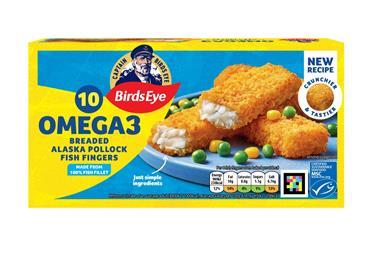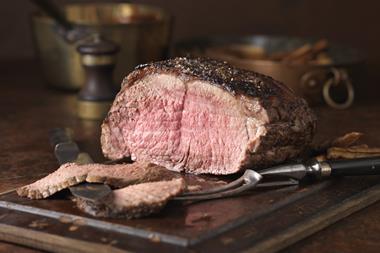Food and farming minister Jim Paice joins three of the red meat industry’s leading lights in assessing the sector’s challenges and opportunities – from inflation and profitability to supply chain relationships and Mercosur talks
The panel
Jim Paice: food & farming minister, Defra
Louise Welsh: agriculture manager, Morrisons
Ton Christiaanse: chief executive, Vion Food UK
John Mercer: chief livestock adviser, NFU
How have shoppers’ red meat buying habits changed since the start of the recession? Are there signs that red meat sales are recovering from the impact of the recession?
Ton Christiaanse: The squeeze on household budgets is impacting on many grocery sectors. The recession saw switching between proteins, between cuts, and between quality tiers, and although there has been some increased interest in premium products, some of this growth has been driven by promotional activity. Restricted consumer expenditure means that industry investment in development of premium produce is not delivering the forecast returns.
Louise Welsh: As a retailer, we continue to overtrade on red meat, and it’s a very important part of our business. Our sales are up 13% year-on-year despite the recession, so clearly more and more people are buying their red meat from us because they know it’ll be excellent quality at an affordable price.
Jim Paice: British meat is currently produced to higher welfare standards compared with other European Union member states, and we can be proud that we meet the high standards demanded by our consumers.
We support the industry’s voluntary code, which sets a high level of country-of-origin labelling and involves a number of key organisations that are spreading good practice across the industry. British consumers are now among the best informed in Europe, with the confidence that if the product’s label says it is British, then it really is British meat in the packet.
Ton Christiaanse: We should be rightly proud of the quality of British meat, whose quality and welfare standards are exceedingly high. However, to ensure the long-term sustainability of the UK sector, we must adopt a learning culture. The UK can learn from others, and not just within the meat sector.
Louise Welsh: We have plenty to be proud of as far as quality is concerned and, of course, our traceability is excellent too. It’s a case of not resting on our laurels, though, and being prepared to examine production methods around the globe to see if there’s anything we can incorporate in our own supply chain to give even better-quality beef, lamb and pork.
Ton Christiaanse: Consumers have been educated to buy only during promotions, and in 2011 the intensity of promotions is at record levels, as retailers fight for dwindling consumer spend. Promotional activity is so intense that inflation is not immediately visible to consumers and, as a result, buying behaviour is driven largely by promotions, not underlying food inflation. This trend could have a serious impact on food security.
Jim Paice: Continuing high input costs present the greatest challenge to UK meat producers, although it is also difficult to maintain a living when economic pressures are not shared across the supply chain. Retailers and processors have a role in making sure that farmers get a fair deal both in good times and bad.
John Mercer: There is no doubt that the biggest single threat to red meat production is continuing poor levels of profitability, with rising costs and prices below the costs of production. But the discussions surrounding the future shape of the CAP are also a major challenge for the livestock sector, which has historically been extremely reliant on support.
Jim Paice: The current CAP talks are yet to be concluded, but given the importance of delivering value to taxpayers across Europe, these payments will not be immune to spending constraints. The implications for beef and sheep farmers are yet to be seen, but it is clear all will need to become more efficient and less reliant on the single payment.
Louise Welsh: Through our abattoirs, processing and manufacturing facilities, Morrisons is very much part of the British red meat sector and, like our fellow red meat companies, we are always looking at ways to better manage market volatility and at the same time become more efficient and cut out unnecessary costs. There are no easy answers out there; the challenge is to become even better at it.
John Mercer: It is important that we see greater and stronger relationships developed within the red meat sector in order to help mitigate against volatility. Producers need to try and gain a greater understanding of marketing, in terms of understanding not only what the market wants and will reward them for, but also the influence that seasonality will have on supply and therefore price.
While it is vital that the whole supply chain recognises the need to take a greater share of the risk and that we see a fairer price for meat, it’s also important that farmers try to reduce production costs and introduce efficiencies.
Ton Christiaanse: The scale of the increases in grain prices that impact directly on feed prices, together with significant hikes in fuel and packaging costs, simply cannot be absorbed by farmers, processors and retailers, and must be fed through to consumers. The solution must be that we replace short-term tactical trading with new strategic supply chains that work together to take real waste and cost out of the system for the long-term benefit of the consumer.
Jim Paice: There are a number of reasons for the British red meat industry to be optimistic. Overseas consumers are more confident in the safety of our red meat, a growing middle class in many developing countries is expected to increase demand, and packaging innovations mean meat will stay fresh for longer, expanding the markets it can reach.
John Mercer: We are seeing a growing world population, and with this will come a growing demand for protein and red meat. I also believe there is a huge opportunity to promote British provenance and the Red Tractor and all the standards it represents, and to greater promote the reasons for buying British.
Louise Welsh: Production continues to trail consumption, which strongly indicates a very real opportunity to increase production levels to meet the growing demand.
Jim Paice: A deal with Mercosur could benefit UK consumers, who might see a wider choice of product and, potentially, keener pricing. However, it’s important that UK producers don’t suffer by the sudden arrival of new competition, so any changes must be phased in, allowing time for the industry to adjust.
John Mercer: We do have concerns that beef from some countries may not meet the same standards as ours. We are presently analysing the European Commission’s impact assessment, which shows that a deal could potentially cost the EU beef industry in excess of £3bn, and farmgate prices could fall by at least 8%. This is hugely worrying, and the NFU is lobbying hard across Europe to ensure that the impacts are widely understood.
Louise Welsh: The sector should be leading the drive towards finding solutions to these important issues. Helping build a profitable industry one that takes care to minimise its carbon footprint and is able to provide quality, yet affordable, food for future generations is in all of our interests.
Ton Christiaanse: There’s a need to recognise that raw materials are not a tap to turn on, or off, at will. The world expects farmers to make an enormous transformation to re-position production systems to increase both their efficiency and their environmental sustainability. Globally, farming is big business, but it is not big enough to meet these challenges alone. This requires the active collaboration of all supply chain partners, from farmers and processors, to retailers and foodservice operators.
What impact will the UK government’s spending cuts have on the industry?
John Mercer: Any spending cuts that result in costs being passed back to industry will obviously have the potential to affect profitability margins. However, there may be potential benefits if government cuts result in greater responsibility being given to farmers through greater levels of self-regulation.
Jim Paice: We’re completely changing the way that government works, and this includes putting more trust in the people who produce our food. We are committed to supporting and developing all British farming, for example, by supporting the industry-led task force on farming regulation. The task force has been looking carefully at where improvements, and savings, could be made to the benefit of both government and the meat industry.
Louise Welsh: Finding an answer to this very question is at the heart of the Morrisons Farming Programme. We are investing in a broad range of applied research projects some focused on our own farm all with the potential to help improve the financial viability of farm businesses and effectively keep Britain farming.
More than 11 million people shop in our stores every week, and it’s vital they continue to have the opportunity to buy quality food including beef, lamb and pork at an affordable price.
John Mercer: Red meat is already extremely good value and affordable. After all, consumers spend less than 10% of their budget on food. The retail sector is extremely powerful and influential, and it would be great to see a greater use of this power and weight in a positive manner to help drive sustainability within the supply chain.
Ton Christiaanse: Recent negative headlines have been swiftly followed by other research findings that challenge the findings of the report that generated the original media coverage. This is not an isolated scenario and has resulted in consumers becoming ambivalent to the periodical scare stories. Nonetheless, a constant diet of negative reporting could have some impact on consumer confidence.
What role should government play in creating consumer clarity around the use of halal and kosher slaughtering methods?
Jim Paice: We respect the rights of the Muslim and Jewish communities to eat meat prepared in accordance with their religious beliefs. Some people feel strongly about this, and we agree that they should know what they are buying. We’ve been discussing with the food industry how labelling can give consumers greater choice.
Will consumers be eating cloned animals, or offspring from clones, in 10 years’ time?
Ton Christiaanse: Speed of development and acceptance will not be uniform globally but I don’t expect the UK to be at the front of the queue.
John Mercer: The issue of cloned animals or offspring from clones is not at the forefront of consumers’ thoughts. Any move in this area needs to be based on fact and science, and a balanced argument.
Louise Welsh: Difficult to tell, but it’s likely that the final say will lie with consumers themselves. There would be little point in stocking a product that no one wanted to buy.
Read the full Meat & Fish Supplement 2011
Sign in to comment on this article
Not logged in before? Register for FREE guest access today.
You will be able to:
- Read more stories
- Receive daily newsletters
- Comment on stories
Advert



















No comments yet